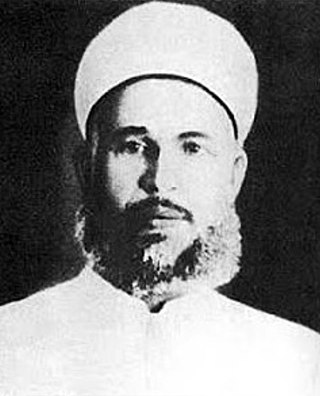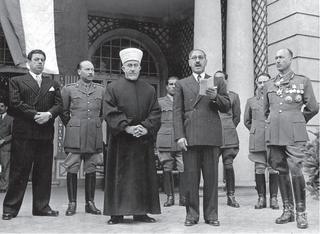
Mohammed Amin al-Husseini was a Palestinian Arab nationalist and Muslim leader in Mandatory Palestine. Al-Husseini was the scion of the al-Husayni family of Jerusalemite Arab nobles, who trace their origins to the Islamic Prophet Muhammad.

A popular uprising by Palestinian Arabs in Mandatory Palestine against the British administration of the Palestine Mandate, later known as The Great Revolt or The Great Palestinian Revolt, or the Palestinian Revolution, lasted from 1936 until 1939, demanding Arab independence and the end of the policy of open-ended Jewish immigration and land purchases with the stated goal of establishing a "Jewish National Home".

Yishuv, HaYishuv HaIvri, or HaYishuv HaYehudi Be'Eretz Yisra'el denotes the body of Jewish residents in Palestine prior to the establishment of the State of Israel in 1948. The term came into use in the 1880s, when there were about 25,000 Jews living in that region, and continued to be used until 1948, by which time there were some 630,000 Jews there. The term is still in use to denote the pre-1948 Jewish residents in Palestine, corresponding to the southern part of Ottoman Syria until 1918, OETA South in 1917–1920, and Mandatory Palestine in 1920–1948.

ʿIzz ad-Dīn ibn Abd al-Qāder ibn Mustafā ibn Yūsuf ibn Muhammad al-Qassām was a Syrian Muslim preacher, and a leader in the local struggles against British and French Mandatory rule in the Levant, and a militant opponent of Zionism in the 1920s and 1930s.

Revisionist Zionism is a form of Zionism characterized by territorial maximalism. Revisionist Zionism promoted expansionism and the establishment of a Jewish majority on both sides of the Jordan River.

Haim Arlosoroff was a Socialist Zionist leader of the Yishuv during the British Mandate for Palestine, prior to the establishment of Israel, and head of the political department of the Jewish Agency. In 1933, Arlosoroff was assassinated while jogging on the beach in Tel Aviv.

Fawzi al-Qawuqji was a leading Lebanese-born Arab nationalist military figure in the interwar period. The British military were impressed by his military acumen when he served briefly in Palestine in 1936 fighting the British Mandatory suppression of the Palestinian Revolt. A political decision by the British enabled him to flee the country in 1937. He was based in Nazi Germany during World War II, and served as the Arab Liberation Army (ALA) field commander during the 1948 Palestine War.
The Palestinian Arab Party was a political party in Palestine established by the influential Husayni family in May 1935. Jamal al-Husayni was the founder and chairman. Emil Ghuri was elected general secretary until the end of the British Mandate in 1947. Other leaders of the party included Saed al-dean Al-Aref, Rafiq al-Tamimi, Tawfiq al-Husayni, Anwar al-Khatib, Kamil al-Dajani, and Yusuf Sahyun.
The Black Hand was an anti-Zionist and anti-British Jihadist militant organization in Mandatory Palestine.
Socialist Workers Party was a political party in the British Mandate of Palestine from 1919–1922. Its followers were known as Mopsim.

Rashid al-Haj Ibrahim (1889–1953) was a Palestinian Arab banker and a leader of the Independence Party of Palestine (al-Istiqlal). He was one of the most influential Arab leaders of Haifa in the first half of the 20th century and played a leading role in both the 1936–39 Arab revolt and the 1948 Battle of Haifa.

Events in the year 1935 in the British Mandate of Palestine.

Relations between Nazi Germany (1933–1945) and the Arab world ranged from indifference, resistance, collaboration and emulation. Nazi Germany used collaborators throughout the Arab world to support their political goals. The cooperative political and military relationships were based on shared hostilities towards common enemies, such as the United Kingdom, the French Third Republic, along with communism, and Zionism. Another foundation of such collaborations was the antisemitism of the Nazis and their hostility towards the United Kingdom and France, which was admired by some Arab and Muslim leaders, most notably the exiled Palestinian leader, Grand Mufti of Jerusalem, Amin al-Husseini.
The Palestine Arab Congress was a series of congresses held by the Palestinian Arab population, organized by a nationwide network of local Muslim-Christian Associations, in the British Mandate of Palestine. Between 1919 and 1928, seven congresses were held in Jerusalem, Jaffa, Haifa and Nablus. Despite broad public support their executive committees were never officially recognised by the British, who claimed they were unrepresentative. After the British defeat of Ottoman forces in 1918, the British established military rule and (later) civil administration of Palestine. The Palestine Arab Congress and its organizers in the Muslim-Christian Associations were formed when the country's Arab population began coordinated opposition to British policies.

Mandatory Palestine was a geopolitical entity that existed between 1920 and 1948 in the region of Palestine under the terms of the League of Nations Mandate for Palestine.

The Arab Higher Committee or the Higher National Committee was the central political organ of Palestinian Arabs in Mandatory Palestine. It was established on 25 April 1936, on the initiative of Haj Amin al-Husayni, the Grand Mufti of Jerusalem, and comprised the leaders of Palestinian Arab clans and political parties under the mufti's chairmanship. The committee was outlawed by the British Mandatory administration in September 1937 after the assassination of a British official.
This is a timeline of intercommunal conflict in Mandatory Palestine.
Muhammad Najati Sidqi was a Palestinian public intellectual and activist, trade unionist, translator, writer, critic and erstwhile communist. Though almost forgotten as a figure in the Palestinian movement for independence, he played an important role in it, and witnessed many momentous moments in the early history of the 20th century. Aside from his native Arabic, he was fluent in French, Russian and Spanish.
Al-Futuwwah was the youth organisation of the Palestine Arab Party in Palestine. The organisation was created in February 1936 by the al-Husseinis to counteract their rivals' al-Nashashibis National Defense Party. It was, to some extent, modelled on the Hitler Youth organisation in Germany.
The Nazi Party in Mandatory Palestine, also referred as the Nazi Party of Palestine and the Levant was a local branch of the Nazi Party in British-ruled Mandatory Palestine, established by members of the German Templer colonies in Palestine. The branch was established in March 1933 and gradually eradicated during the World War II by the British authorities via deportation of its members and their families. Some of the party members enlisted into the Nazi German military and participated in operations on behalf of the axis powers, notoriously including Operation Atlas targeting Mandatory Palestine.










